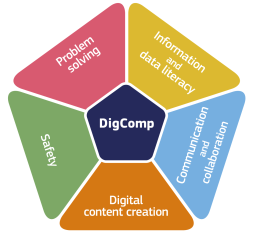Written by Douaa Batersh
Reading time: 7 minutes
How To Keep Yourself Up-to-date
Youth leadership is the practice of gaining skills and knowledge necessary to lead in youth related work, for example, in the field of education and career development. Which also include the practise of digital skills, the ability to analyse their strengths and weaknesses, the ability to strengthen their self-esteem, and to let young people set their own future goals by taking into consideration what they are good at and what gives them the motivation to achieve these goals. Especially nowadays they are in need of a leader to lead and inform them, and what better way than to use the internet to enhance their digital competences.
How to enhance Digital skills of Youth leaders?
- Identify digital skill gaps, looking at each and every one of the individuals to catch his or her points of view of where they lack the digital competences. In this way, we are prioritizing them by filling in the gaps other individuals had and by giving them the info they were lacking as well as the exercises and participation they need to overcome the circumstances they may face. Every individual should brainstorm about using digital skills before any step that will be taken to see were these skills can be used effectively. From logging into a governmental portal, to transfer via online banking.
- Online courses and Webinars related to leadership are increasingly important in the current age of technology, which simplifies many aspects of daily life, including education and work. The convenience of accessing these resources from home allows individuals to expand their knowledge in various fields. Engaging in such online educational activities not only enhances one’s understanding of leadership but also boosts self-esteem and teamwork skills. Additionally, these courses and webinars offer opportunities to improve communication skills through interactions with fellow participants from diverse countries. This approach to learning and skill development is a testament to the benefits of technological advancements in the field of education.
- Provide a suitable environment, for brainstorming is crucial, especially when the surrounding atmosphere isn’t conducive to deep thinking and idea generation. Distractions can demotivate individuals, making it essential to create a setting that enhances digital skills. This includes equipping the space with advanced computers, ensuring perfect lighting, and providing a robust network. Furthermore, the presence of good leaders can make the environment more comfortable and friendly, keeping members excited about their projects.
- Boost the ability of learning, boosting the ability to learn is also vital. Each individual excels in specific areas, and it’s impossible to be proficient in everything simultaneously. This reality underscores the importance of continuously adding new information and skills to one’s repertoire. In the context of digital literacy, it’s particularly important to equip the youth with skills in cybersecurity, social media management, hacker detection, and content creation and editing.
- Follow Industry Leaders and Trends, youths interested in the digital field should stay updated with the latest developments. This can be achieved by following industry leaders on social media, subscribing to relevant blogs, and listening to podcasts. These resources provide insights and keep youths informed about new tools and techniques in their areas of interest.
The Essential Importance of Digital Skills
In the realm of food production, digital skills have become crucial for enhancing productivity. Modern farmers, moving away from traditional hand harvesting methods, are increasingly utilizing machinery to save time and effort while boosting output. This technological integration is evident in the use of barcodes and iPads in restaurants, streamlining the ordering process and enabling the fulfillment of more orders efficiently.
Furthermore, the accessibility of information through the internet has been revolutionized. Platforms like Google, YouTube, and various other applications provide abundant information, easily accessible via computers, saving significant time and effort.
Communication, too, has been transformed by digital advancements. It is now easier than ever to engage internationally, with online international courses, conversations with people across the globe, and the opportunity to work remotely. A critical aspect of this digital age is the heightened focus on cybersecurity. As cyber threats increase, securing personal information, online privacy, and digital assets has become paramount, emphasizing the need for robust cyber protection measures.

DigComp Framework European Union
The Role of European Institutions In Promoting Digital Skills
First, one of the important things that institutions can do to encourage a larger number of people to follow this program “Digital Skills” is to allocate funds for it. European institutions support programs to enhance digital skills in schools, universities, and vocational training centers, and they ensure that digital skills are integrated into the education and training programs.
For example, On 18 April, in the context of the European Year of Skills, the European Commission has adopted two proposals aimed at supporting the development of digital skills among European citizens. The proposals addressed the lack of a whole-of-government approach to digital education and training, as well as difficulties in equipping people with the necessary digital skills.
The first proposal, a “Council Recommendation on the key enabling factors for successful digital education and training” calls on Member States to ensure universal access to high-quality digital education and training, and to address the digital divide that has become even more evident in light of the COVID-19 pandemic. It proposes a framework for investment, governance, and teachers training to achieve effective and inclusive digital education.
“These proposals underline the need for everyone everywhere in Europe to have access to digital education. We need to do much better on digital skills and treat them with the same importance as reading and writing. The aim is to reach a target of at least 80% of all adults as a minimum with basic digital skills, and 20 million employed ICT specialists including a lot more women, by 2030″ – Margrethe Vestager, Executive Vice-President for a Europe Fit for the Digital Age.
The second proposal, a “Council Recommendation on improving the provision of digital skills in education and training” addresses the varying levels of digital skills within different segments of the population and the ability of national education and training systems to address these differences.
It calls on Member States to provide digital skills coherently through all levels of education and training and to establish incremental objectives and targeted interventions for specific priority or hard-to-reach groups. “A Europe fit for the digital age needs to lead not only in technology but also in education.
The education and training systems must embrace the opportunities offered by the digital age and empower learners with the competences and skills needed to set them up for success in their present and future. The institutions must respond more effectively to the increased needs for digital skills for learning, for life and for the labour market”. Margaritis Schinas, Vice-President for Promoting our European Way of Life.
The following actions also play a vital role
• the SELFIE tool (Self-reflection on Effective Learning by Fostering the Use of Innovative Educational Technologies)
• SELFIE for TEACHERS to support teachers’ digital competence and to enhance learning in the digital age
• Collaborations with the European Investment Bank (EIB), for example through the InvestEU programme, to enable Member States access to funding for digital and physical infrastructure and to support the development of skills and innovative pedagogies
• the 2021-2027 Erasmus+ and European Solidarity Corps programmes have been made more green and digital
• the Recovery and Resilience Facility supports Member States in addressing their needs in digital education, following the COVID-19 pandemic
• the European Social Fund promotes the development of digital skills as a vehicle to ensure better and fairer job opportunities for European citizens
• the new Digital Europe Programme (DIGITAL) focuses specifically on boosting advanced digital skills
Ultimately, the most effective training programs and courses are those that address the gaps in digital skills that individuals may have. The enhancement of digital skills is directly linked to increased opportunities and benefits in the online world. Therefore, there is a pressing need to support student success in the digital realm. Efforts should be concentrated on empowering students with a fundamental set of digital skills. This approach acknowledges the growing importance of digital literacy in the modern world. However, the question arises: should digital skill education be considered a core competency for future education? This query reflects the evolving landscape of education and the increasing relevance of digital proficiency in various aspects of life and work.

“Douaa is a 22 years old Biology student at the Lebanese University Faculty of Science. Born and raised in the capital of Beirut and interested in doing her Master’s in Forensics Science abroad. Moreover, Douaa is interested as a researcher in the field of environmental sustainability and its effects on the overall biodiversity, that’s why she got in touch with CoSE and immediately was interested to join the team to raise awareness on this important topic, not only from a European perspective but also for the Middle-Eastern youth in general. She is particularly focused on fashion design and its recycled and organic materials. Therefore, she is hoping to mash both natural materials and clothing together to reach sustainability in the fashion industry.”
BIBLIOGRAPHY
References: – https://digitalskills.unlv.edu/digital-marketing/what-are-digital-skills/
– https://education.ec.europa.eu/focus-topics/digital-education/about-digital-education
– https://www.digitaleurope.org/news/case-studies-on-digital-skills-and-inclusion/
–DigComp Framework (europa.eu)


